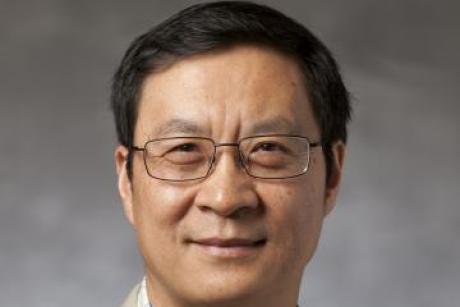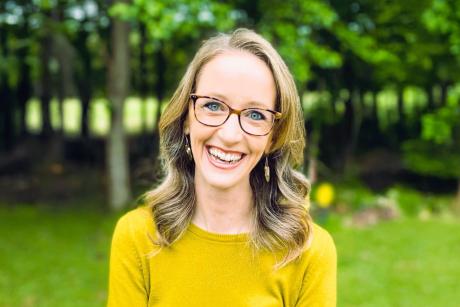
Mya Harris, center, speaks with an attendee about the Bass Connections project she's a team member of during the program's showcase event on April 16.
Published April 22, 2025, last updated on May 5, 2025 under Education News
When Justin Rasmussen joined Duke’s Bass Connections program last fall, he was beginning his final year as a doctoral student in clinical psychology at Duke. He became a co-lead of Caminando Juntos, or “Working Together” in Spanish, a family-based mental health intervention for Latinx communities in Durham and Milwaukee alongside Maeve Salm, a clinical research coordinator with the Duke Center for Global Mental Health.
While this experience is a first for Rasmussen, the project has much longer roots. It originated in the late 2010s in Kenya, where DGHI associate professor Eve Puffer called it “Tuko Pamoja”, or “Coping Together” in Kiswahili. It was later adapted to support families in Durham as they coped with stress during the COVID-19 pandemic. Team members have carefully adapted the intervention to align with the cultural differences and needs in each context.
“A lot of times, people try to shoehorn something into a community that was developed somewhere else,” says Rasmussen, but that’s not the case for this project.
The project was one of 55 featured at the Bass Connections Showcase on April 16. It’s one of nine projects hosted by the Duke Global Health Institute, addressing global health issues in countries such as China, Nigeria and the Philippines. DGHI has supported Bass projects from more than a decade, providing hands-on experience for students who work with community organizations on a range of interdisciplinary issues.
"If you want to solve problems, you need to bring [different] voices to the table,” says Lysa MacKeen, DGHI’s senior associate director for experiential learning and graduate admissions and Bass Connections’ global health theme administrator. “Bass Connections does that effectively by building structures that invite those voices into that conversation. It’s one of the great strengths of the program.”
Mya Harris, a senior majoring in neuroscience and psychology with a minor in global health, was drawn to the Caminandos Juntos project to learn more about the step-by-step process of adapting interventions across cultures.
“There’s a lot of mental health interventions created for individuals, but this is trying to improve communication and synergy and use the family [unit] as a source of resilience,” she says. “I saw how targeting the family can strengthen their connections and help them better face issues.”

From left to right, Corbin Hite, Anselme...
Another project, one of four presenting at the Bass Showcase co-funded by DGHI, found elevated lead contamination in soil in more than 180 North American cities. The toxicity stems from ash left by waste-incinerators that were discontinued in the 1960s and earlier.
Anselme Dossou, a Ph.D. candidate in the Nicholas School of the Environment and a team lead, says there’s a misconception that urbanization has left many populous areas with little soil. “There is soil underneath those buildings,” explains Dossou, who’s interest in soil science began in Benin, his native country. “The lead found is mostly from products that previously used lead such as paint and cosmetic products.”
Lead can cause a range of health problems such as cognitive and behavioral issues in children and increase cardiovascular episodes in adults, Dossou says. The project stems from a study co-led by Daniel Richter, Ph.D., a professor of soils and forest ecology in the Nicholas School of the Environment, that found elevated lead levels in Durham parks in 2023.
The team used digitized records, maps and aerial photography to find locations for the study. One of the project’s goals is to help cities find new sites for greenways and recreational areas.
Dossou hopes the project will also bring about new partnerships that center the health of residents. “Sometimes, what people think is harming them is food, but it can be what’s underneath; it can be where you live,” says Dossou. “We hope more cities will be willing to work with us on screenings in the future.”


